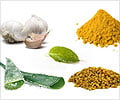Turmeric, the spice that flavours and gives its yellow colour to Indian curries, may hold promise for the prevention of both rheumatoid arthritis and osteoporosis, says a US study.
Turmeric, the spice that flavours and gives its yellow colour to Indian curries, may hold promise for the prevention of both rheumatoid arthritis and osteoporosis, says a US study.
An ancient spice, it has been used for centuries by practitioners of Ayurvedic medicine in India to treat inflammatory disorders.Turmeric extract containing the ingredient curcumin is marketed widely in the Western world as a dietary supplement for the treatment and prevention of a variety of disorders, including arthritis.
At The University of Arizona College of Medicine, Janet L. Funk, MD, working with Barbara N. Timmermann, PhD, then-director of the Arizona Center for Phytomedicine Research, set out to determine whether and how turmeric works as an anti-arthritic.
They began by preparing their own extracts from the rhizome, or root, of the plant, providing themselves with well-characterised materials to test and to compare with commercially available products.
Funk and her colleagues then tested in animal models a whole extract of turmeric root, only the essential oils, and an oil-depleted extract containing the three major curcuminoids found in the rhizome.
Of the three extracts, the one containing the major curcuminoids was most similar in chemical composition to commercially available turmeric dietary supplements. It also was the most effective, completely inhibiting the onset of rheumatoid arthritis.
Advertisement
Completed with the researchers' own prepared, well-defined extracts, the study represents the first documentation of the chemical composition of a curcumin-containing extract tested in a living organism, in vivo, for anti-arthritic efficacy.
Advertisement
The significance, she explains, is that translating the results of trials such as these to clinical use depends on accurate information about the chemical content and biological activity of the botanical supplements available for use.
This work paves the way for the pre-clinical and clinical trials needed before turmeric supplements can be recommended for medicinal use in preventing or suppressing rheumatoid arthritis.
This study also provides the first in vivo documentation of a mechanism of action - how curcumin-containing extracts protect against arthritis. The researchers found that the curcuminoid extract inhibits a transcription factor called NF-KB from being activated in the joint.
A transcription factor is a protein that controls when genes are switched on or off. Once the transcription factor NF-KB is activated, or turned on, it binds to genes and enhances production of inflammatory proteins, destructive to the joint.
The finding that curcuminoid extract inhibits activation of NF-KB suggests that turmeric dietary supplements share the same mechanism of action as anti-arthritic pharmaceuticals under development that target NF-KB.
It also suggests that turmeric may have a use in other inflammatory disorders, such as asthma, multiple sclerosis and inflammatory bowel disease.
In addition to preventing joint inflammation, Funk's study shows that the curcuminoid extract blocked the pathway that affects bone resorption.
Source-IANS
SRM











